In My Sporting Hero, a new podcast series from Nutmeg, footballers talk about the athletes who inspire them. Sometimes those sportsmen and women are also footballers. Sometimes not. You can listen to the audio on this post, on the podcast app of your choice (just search for ‘My Sporting Hero’) or enjoy the written version below.
Our first guest is Craig Levein.
As a player, Levein started his career at Cowdenbeath before moving to Hearts in 1983, where he made over 300 appearances and won 16 caps for Scotland. As a manager, Craig found himself back at Hearts in a productive spell in the early noughties before moving on to Leicester City and later managing Scotland.
He is now manager of St Johnstone.
Craig’s sporting hero is Seve Ballesteros, the Spanish golfer who won five majors between 1979 and 1988.
I had an interest in all things sport growing up, particularly football of course, but I used to occasionally jump onto the golf course where I lived, play a few holes before people could throw me off.
I was a member at a tennis club as well, we were outside doing sports, something just about every day. And it was at the time when Seve was probably the most famous golfer in the world. I just loved the way he played. There was a carefree, try-anything attitude, and I loved that, and his passion. You see after some of his major victories his celebrations and the excitement that he derived from it all – it was really engaging.
Seve was a risk-taker. When I was growing up, a lot of my favourite football players were these swashbuckling, have-a-go kind of exciting characters and I felt he was that in the golfing world. He went from success to success and then, of course, the Ryder Cups and all of the passion that came out.
So when the big events came around, I was tuned in and rooting for him to win. It was really interesting because at the tennis courts, whenever Wimbledon came round, there was this flurry of activity where people all wanted to play tennis. And then World Cups came round and we were playing 14 v 14 in the park. It was whatever sport was current at that time or was on the telly at that time.
When the Open was on, I’d quite often get down to the golf course and jump on and play a few holes. I just loved watching sport on the television. I’d sit there for hours.
I remember watching Ballesteros playing some shots that nobody else played. There’s one in particular – I don’t know if it was the Swiss Open or something like this – he’d landed pretty close to a wall and he had an impossible shot to the green, and he’d looked up through the trees and he saw this hole that he thought he could…
He’d gone birdie, birdie, birdie, birdie, and then he was on the last, if I remember correctly. And he said he could put this ball through this tiny gap in the trees, and right enough, he managed to do it, and not only that, he chipped in with the next shot. So it went from being an absolute disaster to him winning the tournament in one hugely significant shot.
I don’t think there’s anybody else in the golfing world, at that time anyway, who could have done that. Billy Foster was his caddy; I listened to an interview that he did talking about this particular shot. And he was talking through the thought process, and he was thinking Seve was absolutely off his head. That, in itself, is special. But then to chip in – it was a really difficult chip for him. And that just blew me away.
When you see somebody who’s mastered their sport to that degree, then it’s just brilliant to watch. To liken it to football, I would say it’s like Maradona; you know, that kind of level of magic, wizardry, whatever it is. And I was a huge fan of Maradona’s – for somebody so small to be able to outmuscle defenders almost twice his size. He just had such an unbelievable attitude towards football and he was always trying to entertain. And Seve was the leader in the golfing world at that time when it came to entertainment.
Seve laid the groundwork for guys like Tiger Woods. And I always felt he was very respectful, whenever I heard him speaking on the television. Sometimes these mavericks have got a little bit of madness about them – I would say Maradona was maybe in that category! But Seve just seemed to be an absolute gentleman. He had a calmness on the course that was difficult to understand. He never seemed to get flustered about anything, no matter what.
Other people would look at that shot and say, “I’d better chip out sideways here because if I don’t, I could end up running up an 8 or a 9”.
I wanted him to win just to see his celebrations; he celebrated like it absolutely meant the world to him. And that’s inspiring, to see somebody so delighted with how they’ve performed and how they’ve entertained… it’s something really quite magical.
Everybody who you spoke to in those days about golf, Seve was on everybody’s lips, and he was just an absolutely wonderful golfer.
I didn’t know him, and I wish I had, but he seemed to be a really good human being as well. He certainly cared about golf, I got that impression.
Once he got into his groove, I mean he could do anything. He could do six birdies in a row. I know a lot of golfers maybe have done that, but not on the stages that he was doing it on. And he invariably turned up for the big tournaments, didn’t he?
Whenever somebody says ‘Seve Ballesteros’ I smile inwardly. It’s a kind of weird thing, but I just held him in such high regard. He entertained me so much, it brought great joy.
He was instrumental in taking the Ryder Cup to Valderrama. Obviously he’s thinking about his home country as well, and so he’s been a loyal Spaniard in trying to enhance the game in Spain almost by himself, managing to convince them to bring the Ryder Cup to Valderrama. He’s proud of his roots, which is another thing – as a Scotsman, I’m particularly proud of my roots as well.
Him being there, that gave the Europeans a chance of winning the Ryder Cup, because the Americans had dominated it. And he comes along and I believe he helped to galvanize the group of players and got them thinking like a team. He was embracing everybody, and trying to help them.
That led to the Ryder Cup becoming an important competition. I felt previously: the Americans are going to win. And that’s invariably what happened, until he came along and the Ryder Cup has got a lot to be grateful to Seve Ballesteros for. He was the most famous golfer for two or three decades. He had such a charisma about him, I think that people took to him, whether you were a golf fan or not.
When Tiger Woods was at his peak, and when Seve was at his peak, if you got into a showdown with them late on the last day, you’re in trouble. I don’t know how daunting that would have felt, to be going to a playoff against Seve knowing that even if he’s in trouble, even if he’s in the deepest rough, there’s every chance he can magic something to put himself on the green. It must have been terribly difficult for the opponents to take on somebody of that quality and that consistency.
I think people would probably become a little bit intimidated by his aura at times, and the things that he managed to do on the golf course. And then there would be a feeling of some small level of inadequacy – how am I going to compete with this guy? You know, going into the last day, sitting two shots ahead on the leaderboard with him right behind you. You would spend most of the day looking over your shoulder, wouldn’t you?
It would be incredibly difficult to dislike him. For me, one of the most important things about being a leading character in your sport is enjoyment. And he let everybody know just how much he loved playing golf and how much he loved winning.
The fact that he showed the passion – golf’s quite a quiet sport – and to contrast that with his celebrations… you didn’t know all that was inside. Some of it would be relief, I’m sure, but it looked like pure joy on his face whenever he won, particularly a big tournament.
It wasn’t about who he’d beat, because I think a lot of the time they’re playing the course, and he just had more clubs than everybody else, because in his head he had something completely different. And to see some of the shots, maybe some other golfers could see some of those shots, but wouldn’t be brave enough to play them. And there’s a difference. I think he was streets ahead of everybody else inside his head when it came to golf. And I think that he took risks, and invariably they paid off.
You forget sometimes about the practice, don’t you? Because that takes up a hell of a lot of time.
When he was a youngster – I think his dad was a caddy – he only had one club, he had to imagine how to use it in different ways. There’s a lesson there for everybody, isn’t there? If you can go back to the very beginning and start with just the very basics, and ask what can you do with these simple things?
He’s imagining: how can I use this three wood to get the ball over this bunker and then down into the hole? And then coming up with some ridiculous way of doing it. And I suppose when you’ve had that much thought going into something as simple as that, and you manage to overcome whatever problems there are, that must be hugely important in building his confidence.
I’d be standing there saying, ‘Well, I could do it with a three wood, I could do it with a pitching wedge’. Maybe that’s what built him up and made him the player he was, just trying all of these different things that I don’t think any of the other people would even try to practice.
The flamboyancy, the joy in his face, his fist pumps at the end of a golf tournament, was like the end of a football match when it’s been a difficult game and you’ve won, there’s this feeling of achievement and accomplishment. Multiply that by 150,000 if you’re winning a British Open or Ryder Cup.


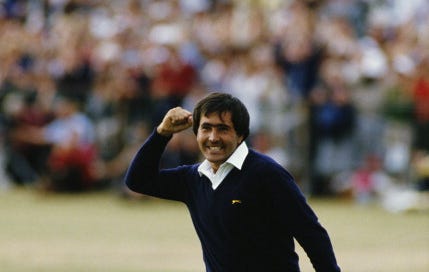
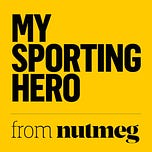


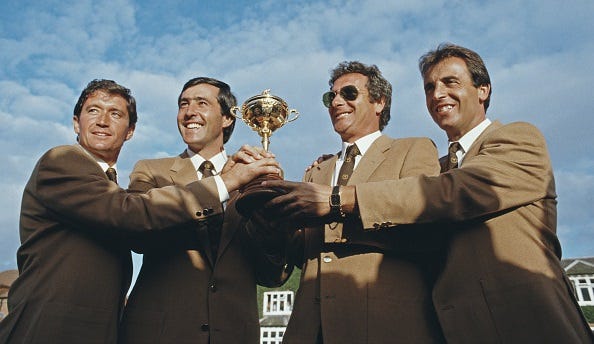

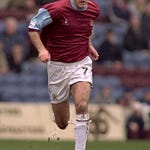
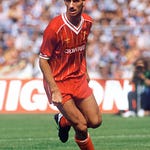






Share this post